WORLD AIRPORTS.COM

































Bournemouth Airport is mak ing no secret of its mission to bloom into a strategic airfreight hub on England’s south coast, as it prepares to welcome...
AeroCapital Solutions (ACS) has an nounced the launch of its A321 freighter conversion programme, as a complement to its current 40-air craft B737-800SF P2F programme. The A321F programme is being launched in part nership with SmartLynx Airlines (Smartlynx), one of the most experienced A321 freighter opera tors in the world. The addition of the programme further exemplifies ACS’s specialisation and ex pertise in the narrowbody freighter market.
The first four A321’s of the joint programme have already been initiated through sale leaseback between the parties, where ACS acts as a lessor and financier, while Latvia-based Smart Lynx efficiently operates the aircraft after conversion completion, adding to its growing cargo fleet to ensure flights in Europe, Asia, Af rica, and South America.
The additional freighters will bring Smart Lynx’s fleet to a total of 15 active aircraft of this type by H1, 2023, with a plan to expand up to 20 by the end of the year. The pas
senger-to-freighter conversions are being undertaken by Precision Aircraft Solutions (Precision) and Elbe Flugzeugwerke (EFW).
The expansion is one of the key compo nents of SmartLynx’s strategic plans to become the largest operator of A321F freighters in the near future. The A321F offers many advantag es, having the highest payload and the most versatile, customer-friendly features in the cargo market today. Moreover, A321F is the most fuel-efficient narrowbody cargo aircraft available, and choosing this type of aircraft underlines SmartLynx`s commitment to more sustainable air transportation.
SmartLynx’s main focus still will be pas senger operations, but the company`s cargo operation volumes are expected to grow from 10% to around 40% in the next two to three years. In the coming years, the airline is plan ning to operate up to 20 aircraft of this type.
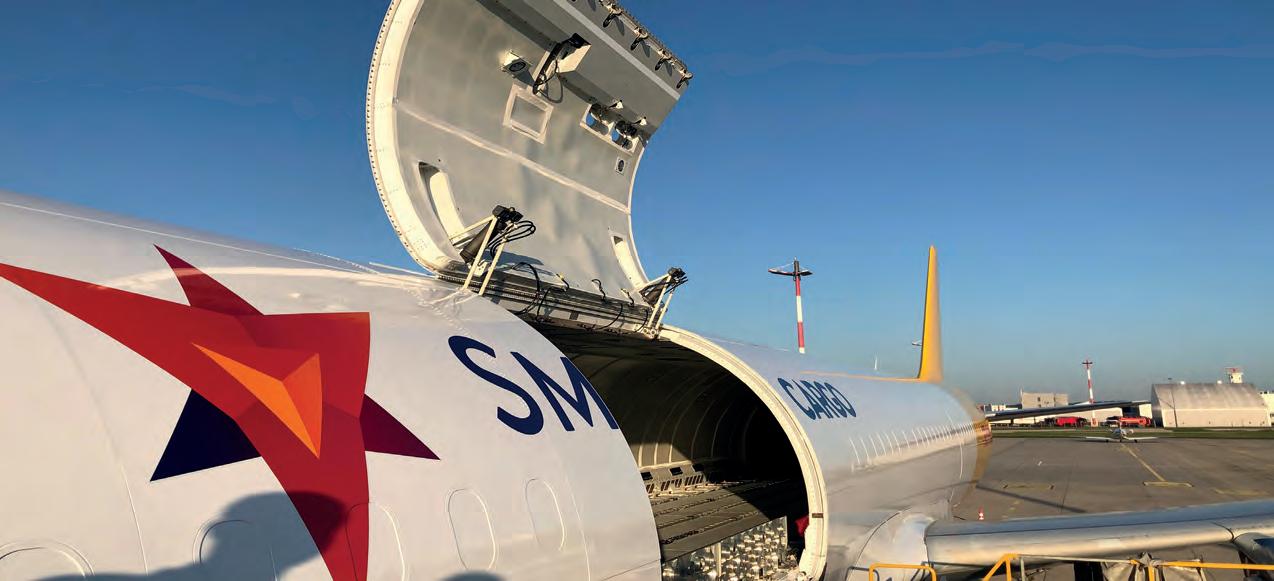
“ACS and SmartLynx have a long-estab lished relationship surrounding passenger aircraft, and we’re excited to continue to work
together as we expand our market-leading A321F capacity and work towards the fleet modernisation. The aircraft are highly efficient with lower operating cost and fuel burn advan tage in comparison to the legacy aircraft, such as the B757, making them substantially more environmentally friendly. ACS’s unique mix of hands-on mid-life aircraft expertise, freighter conversion knowledge, and engine support is an excellent fit for SmartLynx,” SmartLynx CEO Zygimantas Surintas said. “The new Airbus A321F freighters have helped us reduce flight operational costs by up to 15% and ensure up to 20% lower fuel consumption as compared to other aircraft in the class, making the com pany very competitive in the complex air cargo market.”
“We are eager to break into the A321 market with SmartLynx being our kick-off customer. We deeply value our relationship with Smart Lynx and we look forward to helping them grow their A321 freighter fleet,” Jason Barany, CEO and founder of ACS, said.
HONG KONG INTERNATIONAL... Hong Kong International Airport (HKIA), the world’s busiest cargo airport, is deter mined to maintain its position as a leading aviation hub despite a challenging...

BRIAN RODRIGUEZ LOOKS TO... Air Charter Service has appointed the experienced Brian Rodriguez as head of its Florida operation, based in Miami...


UK’S LARGEST PORT REMAINS...
Heathrow Airport holds the illustrious title of the UK’s largest port by value, having handled £153 billion in non-EU imports and exports across a network of over
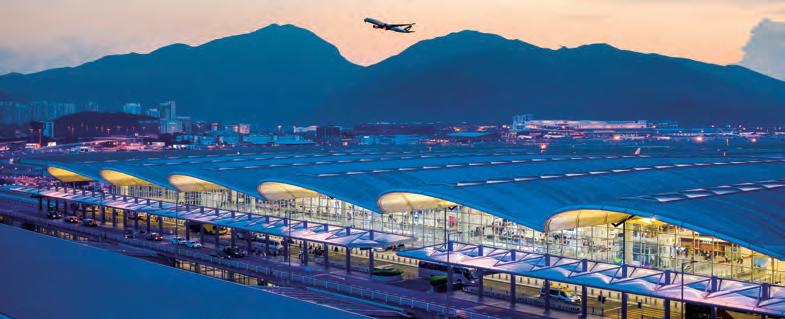
BOURNEMOUTH Airport is making no secret of its plan to bloom into a strategic airfreight hub on England’s south coast, as it plans to welcome six Airbus A340 freighters by early 2023 through its part nership with European Cargo.
This is the latest development for an airport that has been embracing its air freight ambitions since the appointment of Bob Matharoo as head of cargo back in 2021. Shortly after taking on the role, Bournemouth Airport’s managing direc tor Steve Gill was clear that the “cargo business is a critical part of our long-term growth plan.”
Cargo First, Bournemouth Airport’s airfreight operation, really emerged out of the shadow of the pandemic, having been involved in Covid-related shipments from very early on in the crisis. Millions of items of PPE and testing kits for the NHS were imported throughout the airport, showing its ability to be a crucial hub for deliveries in the country, bolstering the UK’s cargo operations.
However, Bournemouth Airport recognised that this was likely to be tem porary and by October 2020 they had already set up regular commercial cargo movements, including new export trade lines to the US, with operations going from strength to strength.
The main driver behind the growth in the volume of cargo handled by Bour nemouth Airport has been e-commerce, according to Matharoo, with this being an area they only expect to grow further. This is set to be bolstered by growing con sumer expectations around the speed of delivery, which Matharoo sees as a “real opportunity.” However, it’s not just about
e-commerce. “We’ve seen growing de mand from Bournemouth for general cargo exports ranging from tyres for the North American Indie car circuit to seafood from Scotland and high value manufac tured goods, including fashion,” Matharoo added.
Bournemouth Airport is determined to make the cargo ownership chain as short and simple as possible. With a combina tion of its location, lack of restrictions and speed, Bournemouth Airport is the “only unconstrained airport in the South of En gland and can offer total slot flexibility for goods in and out.”

“Because the airport and Cargo First are part of the same business, we control every aspect of the process, both airside and landside. And that saves a lot of time compared with larger hub airports where the interactions can be complex, multi-lay ered and less efficient,” Matharoo stated.
“We’ve proven Cargo First as a viable al ternative London gateway for commercial cargo traffic, especially to and from Southeast Asia and North America. We would like to see our volumes double in the next five years,” Matharoo added. “We’re ready to respond to whatever the market de mands and have the flexibility to do so. Our Cargo First Logistics Park has over one million sq ft of warehousing development potential, including new build and repur posing opportunities both airside and landside.”
Bournemouth Airport is not just willing to be a feeder airport to the more tradi tional cargo hubs in the country. It has already gone beyond that, acting as an origin and destination airport serving cus tomers in London and the South East.
HONG Kong International Airport (HKIA), the world’s busiest cargo airport, is de termined to maintain its position as a leading aviation hub despite a challeng ing environment. While the region is now reopening after some of the strictest re strictions, cargo performance at HKIA has remained resilient, with volumes reaching five million tonnes at the airport in 2021the second highest recorded and on par
spokesperson was open about how cargo volumes have been “affected by global economic uncertainties, on-going geopo litical tensions and disruptions to global supply chains.
The pandemic has a significant impact on passenger flight operation, but gener ated high demand for e-commence and transportation of medical supplies. “With the extensive international flight network
with the pre-pandemic level.
Connected with over 220 destinations worldwide that are served by some 120 airlines, HKIA’s strategic location means flights can reach half of the world’s pop ulation in five hours or less. Since the outbreak of COVID-19, the Airport Au thority Hong Kong (AAHK) has been working closely and collaborating with the cargo community to ensure efficient and smooth delivery of cargo. The air port community has been flexible and proactive in maintaining their freighter schedules and mounted additional flights to compensate for the drop in belly capac ity provided by passenger flights.
HKIA’s operations have benefitted from state-of-the-art cargo facilities with high ly automated handling system, a 24-hour electronic customs clearance services and logistics workforce that enables the fast and efficient air cargo handling process.
“Some airlines have refitted their pas senger aircraft to “preighters” to provide all-cargo services. The Civil Aviation De partment of the Hong Kong Government has also sped up the approval of flight slots for freighters, including chartered cargo flights, as well as applications for “preighters,” a spokesperson of Airport Authority Hong Kong said.
“There has been a high demand for e-commerce and express air cargo since the outbreak of COVID. HKIA’s cargo com munity has been working tirelessly to beef up handling capacity to meet demand.”
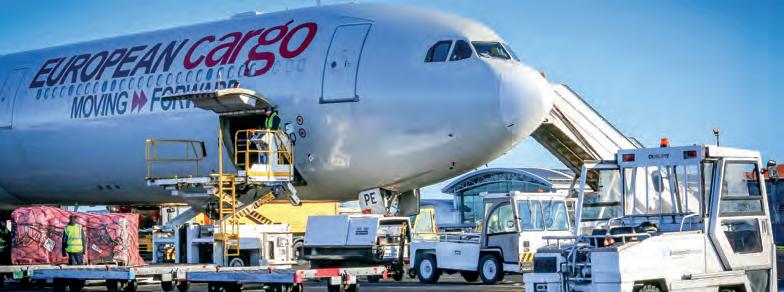
Predicting that the growth of e-com merce and express air cargo will continue, various developments at HKIA have been in full steam to capitalise on the tre mendous opportunities. A premium logistics centre, with a planned floor area of 380,000sqm, is under development by a joint venture led by Cainiao Network, the logistics arm of Alibaba Group. Expan sion of DHL’s Central Asia Hub, which will boost its annual handling capacity by 50% to over one million tonnes, is also planned for completion this year.
Following on from the tough period for the airport over the past few years, the
and the efficient air cargo community, HKIA is able to consolidate its leadership position in a challenging environment,” the spokesperson said.
HKIA’s successes have been aided by the support offered by its partners, such as Cathay Pacific, who recently announced the expansion of their fleet based at the airport. “Business partners hold the key to HKIA’s success. The cargo performance of HKIA has showed resilience of our cargo community. We will continue to work closely with our business partners to maintain HKIA’s position as an internation al air cargo hub,” the spokesperson added.
The airport has been focused on do mestic opportunities, as much as the potential in international trade. Rising air freight demand in the Greater Bay Area (GBA) of Mainland China saw AAHK es tablish a long-term strategy to strengthen HKIA’s role as GBA’s international cargo gateway. To achieve this, HKIA has devel oped a novel cargo operation between a new airside cargo pier at the airport and a logistics park in Dongguan - a manu facturing hub in Guangdong Province. Under this intermodal cargo operation, screening, palletisation and other services for mainland exports will be completed in Dongguan before shipping the goods to the airside cargo pier at HKIA by sea for air transshipment to worldwide destinations.
Looking ahead, HKIA is embracing technological developments to help further enhance cargo operations effi ciencies at the airport. “HKIA has taken the lead to develop a digital ecosystem network for Hong Kong air cargo com munity,” the spokesperson stated, citing the HKIA Cargo Data Platform. The sys tem, launched in 2021, is built on smart technologies that connect supply chain partners through a synchronised network to enhance operations, communications and cargo journey visibility.
“AAHK looks forward to the continuous recovery of air traffic, and will continue to collaborate with the airport community to prepare for the increase of flights and pas sengers,” the spokesperson concluded.

Air Charter Service has appointed the experienced Brian Rodri guez as head of its Florida operation, based in Miami.

“Brian has been with us for more than ten years and has exhibited his knowledge and expertise during his time in the Florida office. He moved from our US HQ in New York seven years ago and has since risen through managerial and directorial positions up to the role of VP of ACS Miami,” Richard Thompson, president of ACS Americas, commented.
“This is the natural progression for Brian and I am sure that he will take his new position of president of ACS Miami in his stride, given his knowledge of how ACS works. He has been in the Miami office since its inception in 2015 and has mentored several of the team there. He is the ideal person to push the further growth of ACS in the region.”
“I can’t wait to get started in my new role. We have big plans for the expansion of our operation down here, continuing the strong growth that we have experienced in the first six months of this year. In terms of revenue we’ve seen a 39% increase when compared to the same period last year, and a 20% increase on pre-pandemic fig ures,” Rodriguez added.
CISMAT (Compagnia Italiana Servizi Marittimi Aerei Terrestri) has marked 40 years in the GSSA industry. Now run by Francesco Traverso Tardy, the company was founded by his father Gianni back in 1982 to capitalise on the chance to combine Genoa’s air port and seaport.
“A company that has been founded in the middle of nowhere in the air freight business has become the larg est independent GSSA in Italy,” Tardy said.


The company originally wasn’t modelled like the GSSA it is today but as a charter broker, as Genoa had around 100 charters organised each year, mainly into Africa and the Mid
dle East.
At the time, the service it provided was a unique product - taking the cargo out of the vessels and moving it through the airport.
As opportunites arose, the com pany started to shift into the GSSA business, having been appointed by three airlines. Shortly after the com pany opened its Rome and Milan offices to support operations across Italy.
Having diversified a lot over the past 10 years, CISMAT has secured contracts for several airlines, includ ing those outside of Italy. “We are not just Italy based. We are strong in Italy, but we have a presence in Europe.”
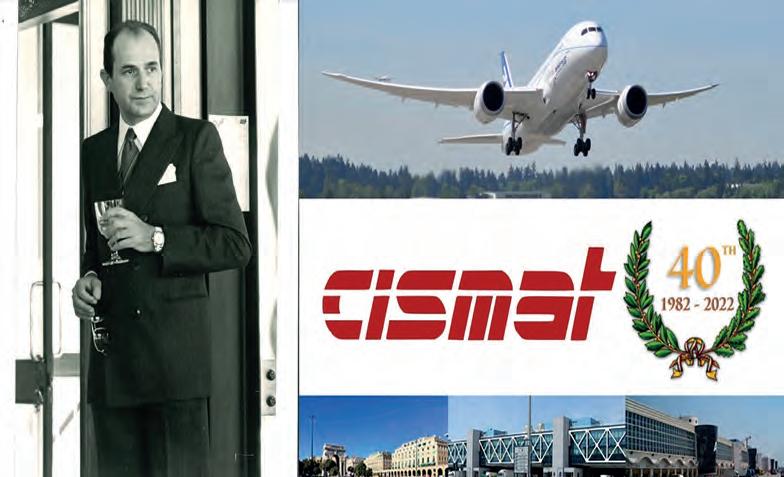

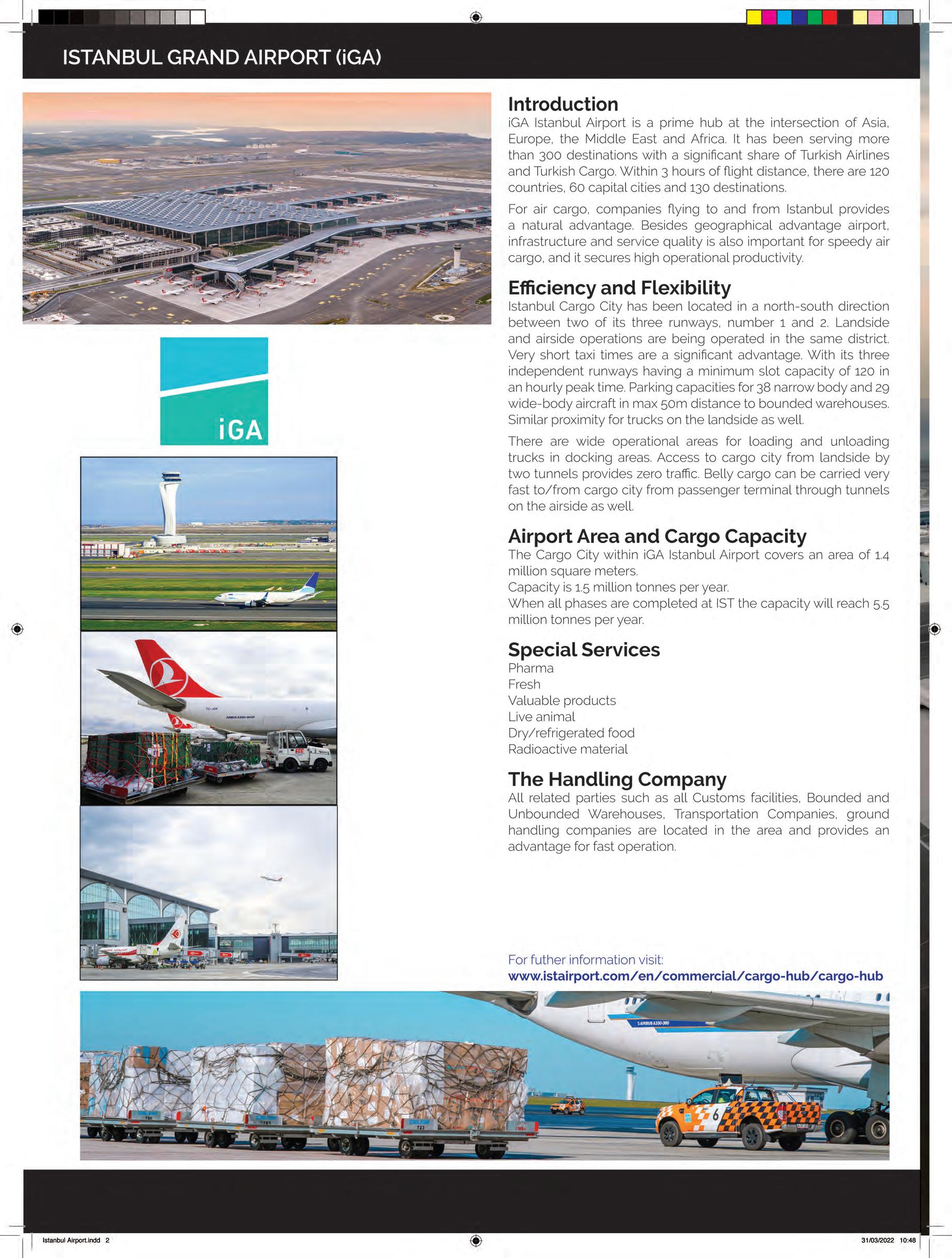
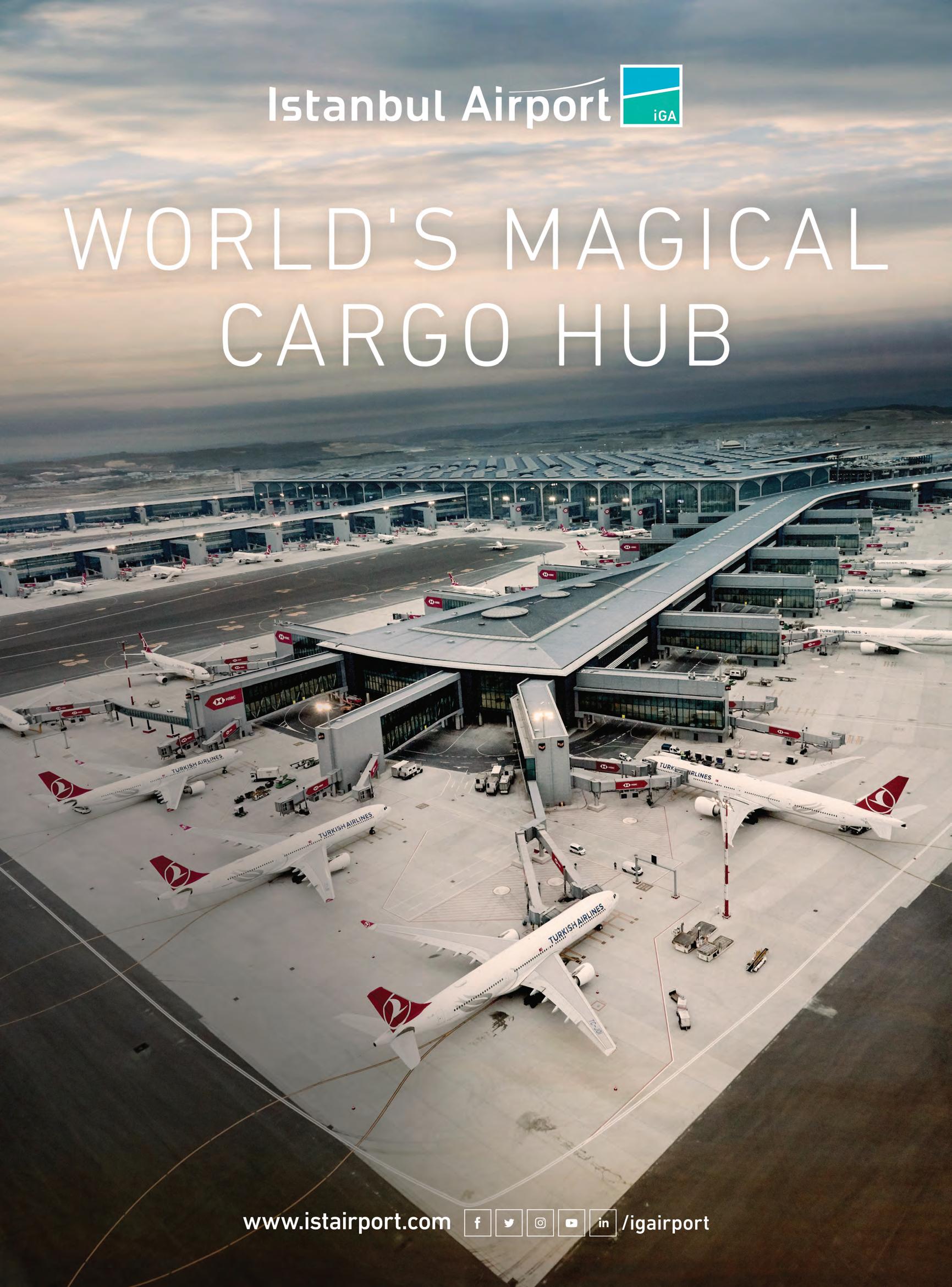
Heathrow Airport holds the illustrious title of the UK’s largest port by value, having handled £153 billion in non-EU imports and exports across a network of over 235 destinations worldwide during 2021, ac counting for 3/4 of all British air cargo.
Despite the collapse in passenger traffic, Heathrow maintained strong cargo volumes throughout, supported the movement of vital supplies like PPE and vaccines. Food exports also formed a sizeable section of the airports traffic, with Britain’s biggest food and drink export, salmon, comprising £237 million worth of the goods flown out of the international hub.
“Macroeconomic factors will always have an impact on the industry. If something is having an impact on the industry, it will clearly then filter down to us,” James Golding, Heathrow’s head of cargo, said. “My guess is there’s definitely been a slowdown.”
While Heathrow managed to redirect its focus during the pan demic, it faced more challenges as a passenger-focused airport than its counterparts that had strong existing cargo operations.
“In the pandemic, we suffered because we didn’t have a big freighter base to fall back on. Yes, airlines converted to freighter but we don’t have that extensive freighter network because of our very strict slot regime, restrictions on night flights, we’re constrained physically in terms of the space that we’ve got.”
Looking at the data, overall Heathrow’s cargo volumes were 14% down in September compared with September 2019 - the last normal year on record. While that might initially seem dis appointing, the month-to-month figures tell a different story, as there was a 6% increase from August to September.
“That’s why our performance compared to some of our Euro pean competitor airports, like East Midlands, was relatively poor in terms of time recovery - because of our reliance on bellyhold,” Golding explained, “Obviously in times of passenger growth and cargo then that does work in our favour but I think what we are always trying to do is achieve that balance. And I don’t think previously we got that balance quite right.”
As the UK and the world started to emerge from the impact of the Covid pandemic at the start of 2022, Heathrow had hoped
that there would be faster growth from a cargo perspective but that was hampered by the geopolitical ripples caused by Russia’s invasion of Ukraine. Amidst all of this though, the airport has started to see the early signs of growth, viewing the next few months as particularly key as the industry heads into the peak Christmas period.
Heathrow is in a different position to other regional and inter national hubs, as it doesn’t own the majority of cargo facilities, meaning that collaboration is crucial with the entire community at the airport and in the wider industry when planning how it will achieve the goals that underpin its broader missions.
Over the past two and a half years, airlines and cargo handlers have been forced to adapt and modify their operations to meet the changing environment. “We need to change our strategy ac cordingly. Really, we are now about how we can grow our cargo proposition in the safest way, most secure way, most sustainable way,” Golding stated.
“We’re working with our airlines, handlers and, to a certain extent, forwarders to work out the details that sit behind each of those headline statements that we’ve made...There are things that we can do as an industry as a whole to collaborate, share best practice to make sure as an industry we’re working most effectively.”
Golding is cautious to describe other airports as competitors, instead calling them comparator airports, as it’s crucial for the cargo sector to maintain good relationships with one another. After all, to move cargo from point A to point B requires two airports seamlessly operating in lockstep.
“If one airport is leading the way on something but doing that in isolation, that’s not really serving the global cargo market. Frankfurt, Brussels, they all have their own specialisms. They’re all serving a slightly different market. And, actually we need to be talking with those airports and sharing where we can.”
As new hubs emerge across the UK, Heathrow isn’t fazed about losing its status as a global cargo hub and the UK’s largest port. In fact, while there will always be an element of rivalry, Golding
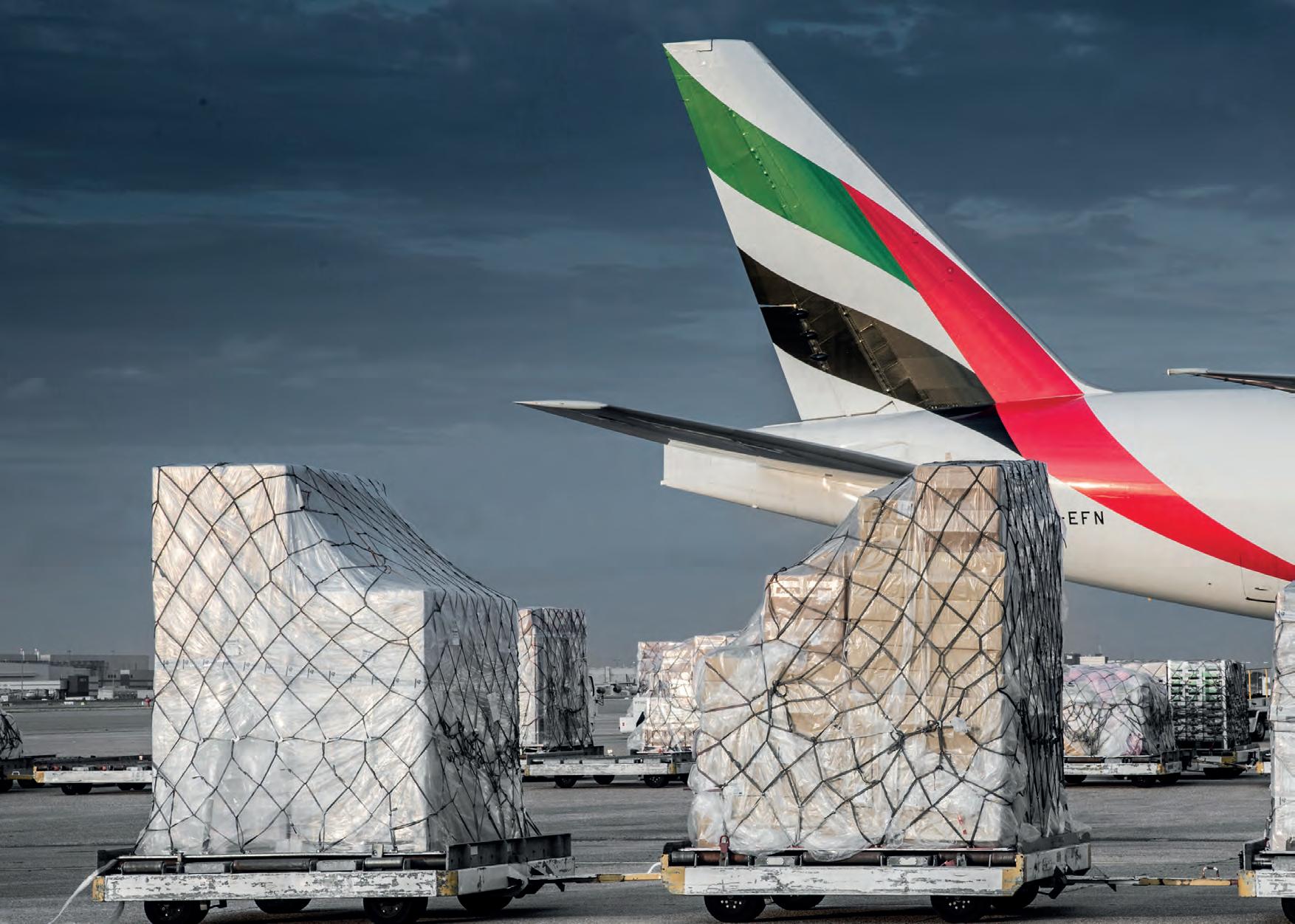
“If one airport is leading the way on something but doing that in isolation, that’s not really serving the global cargo market.”
welcomed the addition of new airports in the cargo space, recognising how it can benefit the UK as a whole by making the market stronger.
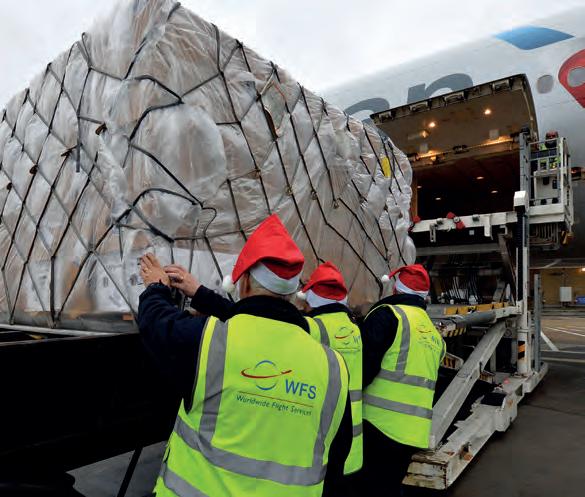
“It’s very similar how we treat our European comparator airports. We need to be collaborating. We need to be as open as we can be. There will always be commercial tension, particularly in a UK context.”

“Are we concerned that we are going to lose routes to other airports? Not really. We’re a primary bellyhold market and the likes of Bournemouth you’re looking at more of a freight er base,” Golding said. “We have a role to play in supporting and facilitating the growth of these businesses to a certain extent, while being conscious of the fact we’ve all got our own commercial agendas as well.”
No one could knock Heathrow’s success as an airport but the team isn’t resting on their laurels. The airport is focused on bold plans to invest in infrastructure over the next five years to grow capacity, as well as the sustainability and effi ciency of its operations.
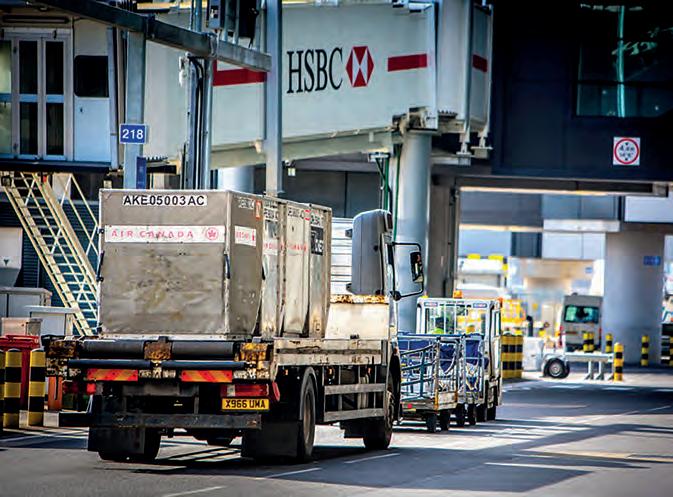
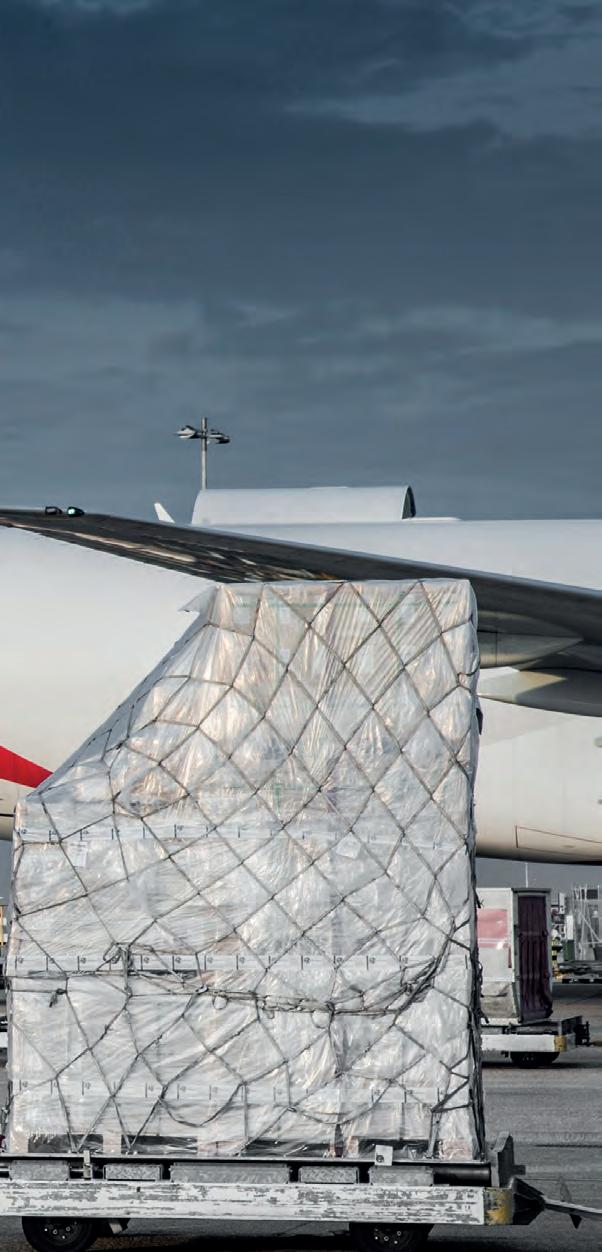
“We need to find a way to make sure that we are maximis ing the advantage of being only 20-25 miles from the centre of London, while being really mindful that we are operating at the finger of our local community,” Golding admitted.
For Heathrow, expansion is twofold. There’s obviously the long-term aspirations to grow the physical footprint of the airport as part of formal expansion plans which have been on pause for the last couple of years. So, Heathrow will be looking to restart those plans in the near future to increase capacity. In the short-term, it is about smaller projects, such as relieving congestion, meeting sustainable strategies and finding ways to be more efficient.
“We very much view our relationship with those property companies [at Heathrow] as a partnership...We work very closely with them to make sure that we are investing to support their delivery as much as their investment supports our own cargo proposition and our own airport...If we’re not working together, we can never make the improvements that we want to make,” Golding added.
Airblox, a platform for airlines and freight forwarders to trade air cargo capacity launched earlier in 2022, is looking ahead to air cargo Forum (ACF) Miami and transport logistic Americas to showcase the first ever tradeable digital block space agreement.

The company, which seeks to provide a new, more efficient way for airlines and forwarders to trade air cargo capacity, sees events like the upcoming conference as giving them a “much-valued opportunity to meet and connect with people in the industry.” Alongside the networking potential, Airblox sees the event as giving them a real chance to explain how their software is the “best way for stakeholders to manage their risk in real time.”

“Air cargo is a people business. TIACA ACF has long been a diary event and is an important fixture in the calendar,” Edip Pektas, co-founder of Airblox said. With a background that cov ers multiple companies in different sectors, from banking to agriculture, he’s passionate about the power of digitalisation in
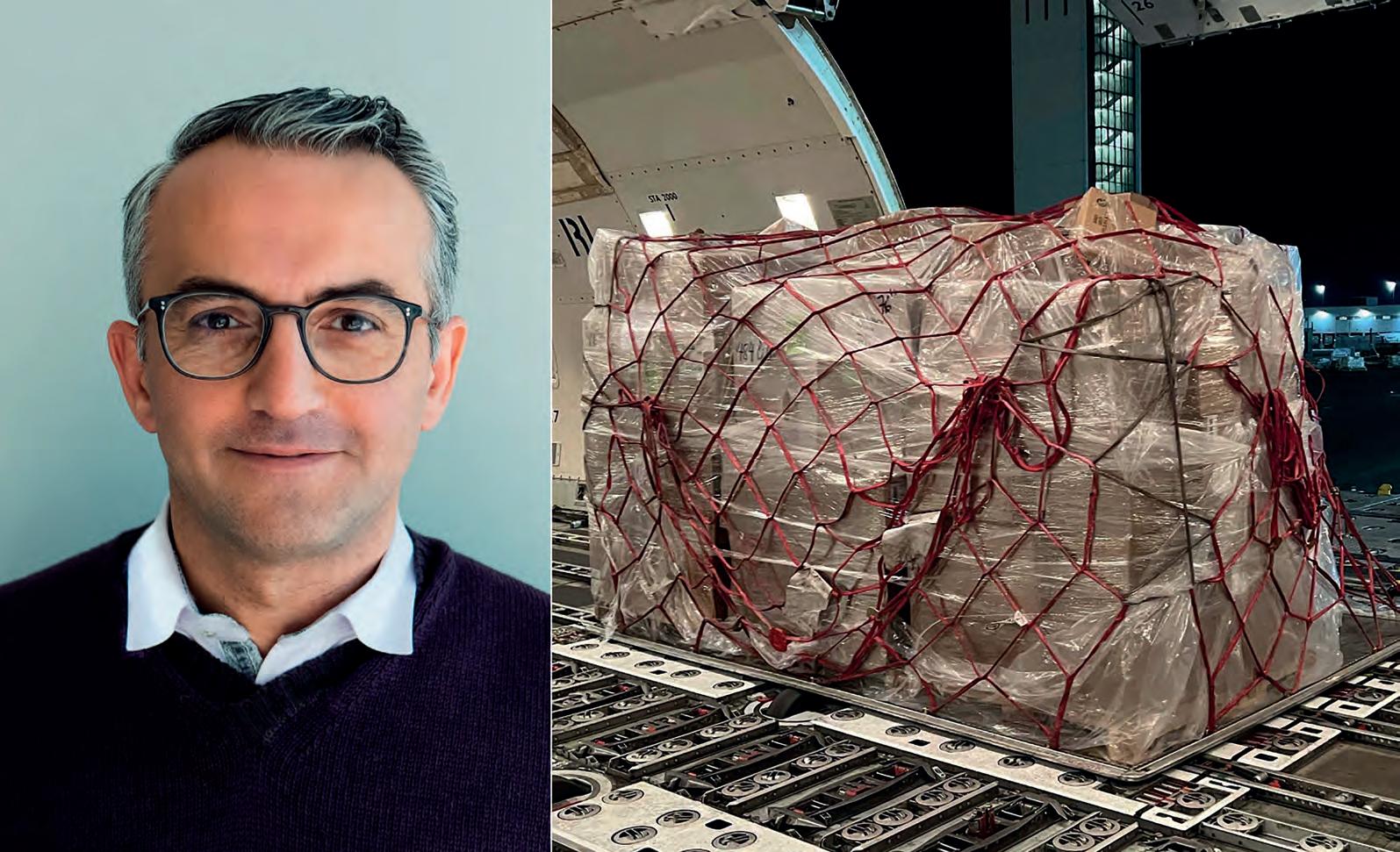
transforming the airfreight industry.
“Aside from making new connections, we want to ensure that Airblox brings its message across to all delegates attending on how buyers of capacity of any size can bid for, buy outright, or block space from the holder using Airblox’s Electronic Block Space Agreements (eBSA),” Pektas explained.
Airblox is on a mission to challenge the status quo of capac ity management, revolutionising the process and providing a flexible, agile and tactical tool for “market participants to visu alise their exposure, expand or contract their capabilities and best of all, another way to manage their risk in real time.”
Digitisation is set to form a key part of the programme at ACF Miami and transport logistic Americas, as attendees ex plore technological advancements and how they can grow companies and the industry at large. Companies like Airblox believe that companies face two options - adopting digital isation or falling behind the competitors and losing out on financial opportunities. “The Airblox platform enhances digital
sustainability and provides a modern solution that optimises negotiation channels, lengthy payment cycles and use of re sources, helping users increase their efficiency,” Pektas added.
Back in May, Airblox unveiled a live feed of global air freight schedule flight capacity to support users of its service. At the time, Pektas stated that the company believes “the future of air cargo capacity is as a tradeable concept, and by launching this new feed, we are a step closer to giving full transparency of the scheduled global airfreight capacity to our users so that they can make informed decisions.”
With ACF Miami having been cancelled in 2020 due to re strictions imposed during the pandemic, this event will mark the first time exhibitors, attendees and partners have been brought together in a couple of years. “It is great to be back out there attending conferences and events around the world once again,” Pektas stated, encouraging those at the event to drop by the Airblox stand at the event if they’d like to meet him or members of the team in person.